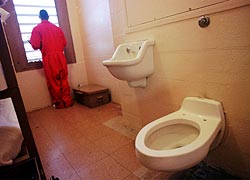|
Eventually, Mike escaped the revolving door in and out of jail.
After his last stalking arrest two years ago, a court found him
incompetent to stand trial and committed him to a state mental hospital.
There, drugs and treatment stabilized him and reduced his psychosis.
Mike's parents are angry at how police and jailers handled their
son, but Mike's mother admits his miserable experiences in jail
motivated him to finally start taking his antipsychotic drugs every
day. That's something he wasn't doing before.
"He was in and out of Abbott Northwestern [hospital], their
psychiatric unit, three or four times. But there again, they'd get
him straightened out and then he'd go off the medication."
The repeat stalking charges, though, prompted a judge to commit
Mike to an extended hospital stay — "which was good," his mother says,
"because he wasn't getting anywhere the way he was going."
But a lot of mentally ill people who get in criminal trouble never
get plugged into treatment. Most don't get medication in jail unless
their psychosis makes them a nuisance to jailers. And in most places
mentally ill inmates leaving jail are not directed to mental health
programs. They're simply let go.
On any given day in any American
city, you'll find some of them wandering the streets and sleeping
on heat grates.
 |
  |
 |
 |
 |
 |
 |
Experts
say as many as half of the nation's 100,000 juvenile inmates have serious mental
illnesses. Unlike those in South Carolina, many receive no treatment behind bars.
AP/Wide World Photos |
 |
  |
"We deal with a lot of [homeless]," says officer David Shotley, who
walks a downtown Minneapolis beat. "We've got quite a few homeless shelters.
How many of them are mentally ill, it's hard to say."
Shotley and his partner, James Stetson, point out a young man in
blond dreadlocks walking across the street, lugging all of his belongings
in a backpack. The officers say the young man shows symptoms of
bipolar disorder—what used to be called manic depression. They've
arrested him for trespassing many times; he has a penchant for walking
into lunch-counters, grabbing handfuls of food and walking out.
Then there's a middle-aged, nervous-looking man with gray hair.
He stands at the corner of 8th and Hennepin smoking a cigarette.
The police call him John-John.
"He's got a parka on, got all his gear with him," Shotley
points out. "He just stands out there and minds his own business.
Some people, you know, they call [us about] him and say he's barking
at people.... You can see his head right now is shaking where he's,
like, talking to himself."
John-John doesn't cause trouble; the officers say they've never
had to arrest him. But they vent frustration about other mentally
ill people they've arrested dozens of times for nuisance crimes
like panhandling and public urination.
"What are you thinking," Stetson says, "to stand
right on the sidewalk here by a restaurant, pull out your unit and
urinate right on the ground where people are trying to eat dinner?"
The street people creating such disturbing sites may have "some
type of a mental disability," Stetson says, "but we don't
know. We're not professionals. So we just enforce the crime part
of it."
Next:
What to Do?
|

